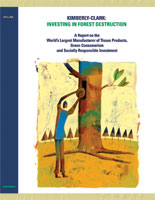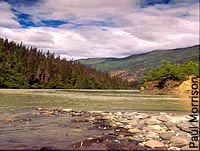
News |
- Lead Still Tops List of Toxics
- UK Gas-Guzzlers to Pay More Road Taxes
- Kleenex - Investing in Forest Destruction
- Conservation Groups Challenge Cheviot Mine Approval
- New Federal Support for Lake Winnipeg
- First Nations Hydro Petitions Tabled
- Scientists Say Arctic Lakes Disappearing
- UK Businesses Call for Long Term Climate Change Policies
- Winnipeg Trial for 2002 Sewage Spill Underway
- New Water Policy from Major Bank
- Pressure to Kill Tulsequah Chief Mine
- Elizabeth May Launches At the Cutting Edge
| Lead Still Tops List of Toxics | 23 June 05 |
 A new report by the Commission for Environmental Cooperation (CEC) under NAFTA warns that lead and its compounds remain the leading developmental toxicant released by industrial facilities. A new report by the Commission for Environmental Cooperation (CEC) under NAFTA warns that lead and its compounds remain the leading developmental toxicant released by industrial facilities.Taking Stock, released May 24, 2005, shows lead pollution has been in decline since the phase out of leaded gasoline, but it still ranks as the top chemical linked to cancer, birth defects and other reproductive harm, with annual releases totaling 43.4 million kg. Lead is a persistent, bio-accumulative toxic substance that can cause developmental damage, especially in children. Even small doses, primarily from deteriorated lead-based paint, or lead-contaminated air, water, soil or dust - have been associated with nervous system damage in fetuses and young children, resulting in learning deficits and lowered IQ. Today, major industrial sources of lead in the environment are primary metals facilities and smelters (66 percent of industrial air emissions) and electric utilities (26 percent of industrial water discharges). Canadian facilities, five percent of the total facilities reporting lead and its compounds, accounted for 42 percent of air emissions in 2002. Ontario had the largest amount of lead air releases, with 145,000 kg, or 15 percent of the total, followed by Quebec and Manitoba. Air releases of lead were on average more than thirteen times greater for Canadian facilities than for those in the United States. View the Commission for Environmental Cooperation May 24, 2005 press release View the CEC report: Taking Stock Source: Commission for Environmental Cooperation |
|
| UK Gas-Guzzlers to Pay More Road Taxes | 23 June 05 |
 British motorists who drive fuel-hungry BMWs, people carriers and Range Rovers may face a five-fold increase in road tax under radical plans to combat the country's ever increasing greenhouse gas emissions. British motorists who drive fuel-hungry BMWs, people carriers and Range Rovers may face a five-fold increase in road tax under radical plans to combat the country's ever increasing greenhouse gas emissions.The British Government's influential energy conservation agency, the Energy Saving Trust (EST), has told transport and environment ministers that the only way to force motorists to buy "green" cars is to introduce a new top rate of road tax as high as £900 a year. Currently, motorists pay a rate of £165 a year for petrol engines. The Energy Savings Trust believes higher road tax would force car makers to redesign these models, by making them more fuel efficient and cheaper to own. British car buyers are ignoring warnings about the dangers of climate change by increasingly choosing luxury cars, larger MPVs and 4x4s with large, powerful engines. Ministers are under intense pressure to rescue Tony Blair's ailing plans to cut the UK's emissions of climate gases by 20 per cent by 2010. The EST has said that the government should also make the most energy-efficient cars tax free or even give motorists a £150 annual tax rebate as a reward for buying them. View the Independent Online article at Planet Ark Source: Independent Online |
|
| Kleenex - Investing in Forest Destruction | 20 June 05 |
 Greenpeace has released a business report entitled Kimberly-Clark, Investing in Forest Destruction: A Report on the World's Largest Manufacturer of Tissue Products, Green Consumerism and Socially Responsible Investment. The April 25, 2005 report highlights tissue product manufacturer Kimberly-Clark's controversial use of ancient forest fibre for its disposable products and points out its false claims of environmental responsibility. Greenpeace has released a business report entitled Kimberly-Clark, Investing in Forest Destruction: A Report on the World's Largest Manufacturer of Tissue Products, Green Consumerism and Socially Responsible Investment. The April 25, 2005 report highlights tissue product manufacturer Kimberly-Clark's controversial use of ancient forest fibre for its disposable products and points out its false claims of environmental responsibility.International environmental organizations have recently launched a public initiative critical of Kimberly-Clark for its role in the destruction of Boreal forests in Canada. The groups, including Natural Resources Defense Council and Greenpeace, are urging Kimberly-Clark to increase the use of recycled fibre and put an end to the sourcing of fibre from ancient and endangered forests, keeping them in step with other consumer products from companies who have already acted to protect forests. Despite its claims of environmental concern, Kimberly-Clark continues to source virgin tree fibre from Canada's Boreal forests, buying pulp from logging companies that engage in unsustainable clearcutting. Companies such as Home Depot, Boise Cascade, Staples, and Office Depot have all recently made commitments to protect ancient and endangered forests. View the April 25, 2005 Greenpeace press release View the Greenpeace report: Kimberly-Clark, Investing in Forest Destruction: A Report on the World's Largest Manufacturer of Tissue Products, Green Consumerism and Socially Responsible Investment (PDF) Visit the Greenpeace web site for the Kimberly-Clark and Kleenex campaign Source: Greenpeace Canada |
|
| Conservation Groups Challenge Cheviot Mine Approval | 20 June 05 |
 Sierra Legal Defence Fund (SLDF) is in Canada's Federal Court to challenge the federal approval of the controversial Cheviot coal mine adjacent to Jasper National Park. Sierra Legal Defence Fund (SLDF) is in Canada's Federal Court to challenge the federal approval of the controversial Cheviot coal mine adjacent to Jasper National Park.The SLDF is representing five conservation groups (The Pembina Institute, Sierra Club of Canada, Nature Canada, Jasper Environmental Association and Alberta Wilderness Association) in the legal appeal of the project June 14th and 15th, 2005 in Edmonton. Cardinal River Coals Limited (CRC) (of Teck Cominco and Fording Canadian Coal Trust) wants to build the mine up against Jasper National Park, in the middle of critical wildlife habitat used by many rare and threatened species, including grizzly bears. After a joint federal-provincial assessment in the late 1990's, CRC made major changes to the project including expanding the mine site and adding a new high speed haul road for shipping coal from the mine to CRC's Luscar mine located to the north. The environmental impacts of the changes have never been assessed, and the Cheviot project has only provided about one quarter of the jobs originally promised. Dianne Pachal, spokesperson for the Sierra Club of Canada, says the appeal is based on the fact that the current project design contravenes an earlier federal court decision. "The federal court found that should the mine proceed as it now is, by dumping millions of tonnes of excavated rock on the streams, it would be contravening the provisions of the Migratory Birds Convention Act (MBCA)," Pachal said. "Our current case asks the court to strike down the federal authorization because the mine is contrary to the MBCA." View the June 13, 2005 press release and backgrounder by the five environmental organizations (PDF) View the June 13, 2005 Hinton Parklander article Sources: Canadian Parks and Wilderness Society - Edmonton, Hinton Parklander |
|
| New Federal Support for Lake Winnipeg | 20 June 05 |
 The Government of Canada has announced a $1.1 million per year investment in the future of the Lake Winnipeg watershed. The Government of Canada has announced a $1.1 million per year investment in the future of the Lake Winnipeg watershed.According to a May 27, 2005 federal government press release, the funds will be used to enhance the scope of water quality monitoring efforts on the Red River and the south basin of Lake Winnipeg, and to provide an ongoing assessment of the biological health of these systems. Along with Canada's Environment Minister, Honourable Stéphane Dion, the Honourable Reg Alcock, President of the Treasury Board were part of the announcement, "This important investment complements the recent federal and provincial announcements on the transfer of the research vessel Namao to the Lake Winnipeg Research Consortium, and the establishment of the Lake Winnipeg Implementation Committee. Together these provide a platform for governments and concerned parties to develop a long term strategy for the restoration and protection of Lake Winnipeg," said Minister Alcock. View the May 27, 2005 Government of Canada press release Source: Government of Canada |
|
| First Nations Hydro Petitions Tabled | 16 June 05 |
 During June 2005, petitions have been tabled in the Manitoba Legislature on behalf of Cree Nation band members. The petitions raise concerns about proposed hydro dams in northern Manitoba. During June 2005, petitions have been tabled in the Manitoba Legislature on behalf of Cree Nation band members. The petitions raise concerns about proposed hydro dams in northern Manitoba. The petitions, signed by many Nisichawayasihk Cree Nation (NCN) band members of Nelson House request Elections Manitoba to supervise the required community referendum votes for the Wuskwatim Hydro Dam. A recent CBC Manitoba I-Team report also revealed questionable spending related to promoting the Keeyask Dam to Tataskweyak Cree Nation (TCN) band members at Split Lake Manitoba. The Auditor General of Manitoba has been asked to investigate by the leaders of both Manitoba Opposition Parties. In late 2004 eight hundred NCN band members signed a petition to the federal government to request a forensic audit of NCN finances. Over 40,000 individuals have also requested a full federal environmental review of the Wuskwatim Project. View the full June 16, 2005 press release (DOC) View the NCN Petition (JPG) View the CBC I-Team report April 8, 2005 View previous ManitobaWildlands.org story: Nelson House Justice Seekers Petition Prime Minister Source: DRSIL, NCN Justice Seekers, Canadian Press |
|
| Scientists Say Arctic Lakes Disappearing | 16 June 05 |
 More than 100 lakes in the Arctic have disappeared over the past three decades, according to a team of Canadian and American scientists, who say climate change at high latitudes may be part of the problem. More than 100 lakes in the Arctic have disappeared over the past three decades, according to a team of Canadian and American scientists, who say climate change at high latitudes may be part of the problem. In the June 3 issue of the journal Science, the researchers report on the changes they tracked in 10,000 large lakes over 500,000 square kilometers of tundra from the early 1970s to 1997-98. They found the total number of large lakes decreased by around 11 per cent. Many shrank significantly, while 125 disappeared completely and were replaced by vegetation. "As the climate has warmed, the permafrost under the lake[s] has thawed fastest and the water from the lake[s] will drain right into the groundwater," said University of Alaska professor Larry Hinzman, a member of the team. The scientific team is now trying to get a handle on how the shrinking lakes will affect wildlife, regional weather patterns and even communities that depend on similar lakes for their water supplies. View the June 6, 2005 CBC News article View the Journal of Science article Source: CBC News |
|
| UK Businesses Call for Long Term Climate Change Policies | 16 June 05 |
 In a letter addressed to British Prime Minister Tony Blair, 13 of Britain's most powerful companies including HSBC, Shell, BP and others have stated there is a need to take urgent action to avoid the worst impacts of climate change. They pledged to engage other businesses, the UK public, governments and international businesses to back the effort. In a letter addressed to British Prime Minister Tony Blair, 13 of Britain's most powerful companies including HSBC, Shell, BP and others have stated there is a need to take urgent action to avoid the worst impacts of climate change. They pledged to engage other businesses, the UK public, governments and international businesses to back the effort. The companies - which between them employ tens of thousands of people and have a turnover of £452billion - said the private sector and government were caught in a Catch 22 situation they wanted to help resolve. The British government has promised to cut carbon dioxide levels by 20% by 2010 (based on 1990 levels) and 60% by 2050. However, emissions have risen since the Labour Party came to power in 1997, and the meeting of those targets is already in doubt. In their letter, the 13 UK companies called for a climate change policy that would create greater certainty about the long-term value of emission reductions. The letter's signatories also urged the government to be brave, saying: "We believe that bold policy action to promote low-carbon investment will create long-term competitive advantages for the UK." View the Guardian Unlimited May 27, 2005 article View other Guardian Unlimited articles on climate change Source: The Guardian Unlimited |
|
| Winnipeg Trial for 2002 Sewage Spill Underway | 13 June 05 |
 The Canadian government has begun prosecution of the City of Winnipeg for a massive spill from a north end sewage treatment plant in 2002. The Canadian government has begun prosecution of the City of Winnipeg for a massive spill from a north end sewage treatment plant in 2002.The city faces two charges under the Fisheries Act stemming from the incident in September 2002, which sent more than 400 million litres of raw sewage into the Red River. The city has pleaded not guilty to discharging a "deleterious substance into a fish-bearing waterway," for the spill, which was blamed on a mechanical failure in one of the plant's five sewage pumps. Winnipeg is planning an upgrade of its water & sewage treatment system that may cost three quarters of a billion dollars. The trial is expected to last several weeks. The city could face a fine of as much as $300,000 if convicted of the charges. View the June 6, 2005 CBC story: regarding the sewage spill trial View the September 19, 2002 CBC story: Sewage leak fixed View the September 17, 2002 CBC story: Raw sewage gushing into Red River View the Manitoba Clean Environment Commission Interim Report on Public Hearings View the ManitobaWildlands.org February 22, 2005 news story Source: CBC Manitoba |
|
| New Water Policy from Major Bank | 13 June 05 |
 HSBC, one of the world's largest banks, announced new freshwater guideline at its annual general meeting May 27, 2005. HSBC's Freshwater Guidance policy prohibits lending for dams that do not comply World Commission on Dams (WCD) recommendations. HSBC, one of the world's largest banks, announced new freshwater guideline at its annual general meeting May 27, 2005. HSBC's Freshwater Guidance policy prohibits lending for dams that do not comply World Commission on Dams (WCD) recommendations.Over the past five years a growing number of governments, UN agencies, and companies have endorsed the WCD approach. Much of the big dam industry, and the World Bank, remain strongly opposed to key parts of the WCD standards. HSBC is the first major private bank to endorse the WCD. The Freshwater Guidance policy states that the bank will not provide financial assistance to: dams that do not conform to the WCD framework; or projects located in or substantially impacting on critical natural habitats, sites on the Register of Wetlands of International Importance of the Ramsar Convention on Wetlands, and UNESCO World Heritage Sites. HSBC says the guidelines ensure that the bank's activities are 'consistent with its focus on sustainable development, and its overall commitment to the environment'. View the International Rivers Network May 27, 2005 press release Visit the HSBC website Source: International Rivers Network |
|
| Pressure to Kill Tulsequah Chief Mine | 13 June 05 |
 International pressure is mounting on Canada's Fisheries Minister Geoff Regan to kill a mining proposal in northern British Columbia; Alaska State Senator Kim Elton and House Representative Beth Kerttula, both Democrats, wrote to Mr. Regan, May 26, 2005 asking him not to approve the mine "until outstanding technical and financial issues have been addressed." International pressure is mounting on Canada's Fisheries Minister Geoff Regan to kill a mining proposal in northern British Columbia; Alaska State Senator Kim Elton and House Representative Beth Kerttula, both Democrats, wrote to Mr. Regan, May 26, 2005 asking him not to approve the mine "until outstanding technical and financial issues have been addressed."Vancouver-based Redfern Resources Corp. president Terry Chandler was quoted last month in the Juneau Empire that his company needs to conduct more mineral exploration this summer. The company announced in mid-May that new tests indicated the proposed mine, in the Taku River watershed that overlaps into Alaska, would involve higher construction and operating costs than anticipated, as well as yield lower mineral resources of gold, silver, copper and zinc. The American politicians are worried that if the mine goes ahead and Redfern declares bankruptcy, there won't be anyone left to compensate Alaskan fishermen for damages. Despite the company's recent announcement Canada's Department of Fisheries and Oceans is currently considering granting federal permits allowing Redfern to build a 160 km road zigzagging through countless fish-bearing lakes and rivers that would lead to the mine in northern British Columbia. The B.C. Government has already approved the mine. Meanwhile, environmental groups are worried that Redfern will likely miss its deadline of June 30, 2005 to clean up toxins spilling out of the old existing mine into the Taku River watershed. View the June 6, 2005 The Hill Times article View previous Manitoba Wildlands' news articles regarding the Tulsequah Chief Mine: May 31, 2005 - Tulsequah Chief Mine Put On Hold March 3, 2005 - Plans to Reopen Mine Opposed Source: The Hill Times |
|
| Elizabeth May Launches At the Cutting Edge | 10 June 05 |
 Canada's undisturbed natural forests - and the wildlife dependent upon them - risk going the way of the northern cod, argues Sierra Club Canada Executive Director Elizabeth May in her updated and expanded edition of At the Cutting Edge: The Crisis in Canada's Forests. Ms. May made a stop in Winnipeg June 8 as part of her tour to promote the new edition of her 1998 book. Canada's undisturbed natural forests - and the wildlife dependent upon them - risk going the way of the northern cod, argues Sierra Club Canada Executive Director Elizabeth May in her updated and expanded edition of At the Cutting Edge: The Crisis in Canada's Forests. Ms. May made a stop in Winnipeg June 8 as part of her tour to promote the new edition of her 1998 book.At the Cutting Edge documents changes in Canada's forest ecosystems from the early days of European settlement, when loggers used hand saws to fell tall trees for sailing masts, to the present day, with loggers in 'feller-buncher' machines having the capacity to clear entire forests in hours. "Canada's present forest management regime," May notes, "pays little attention to maintaining healthy forest ecosystems, focusing instead on maximizing the wood that can be taken out of forests and brought to mills." New chapters in the book focus on climate change, certification, with updated chapters for each province in Canada. "The fact that woodland caribou are threatened in almost every province in Canada is a glaring sign that we are failing to protect forest ecosystems and species," said Ms. May. However, her underlying message is optomistic. During the launch event in Winnipeg she told her audience, "You can't put a price on a life support system. Trees don't give up, neither should we." View the June 9, 2005 Winnipeg Free Press article on Ms. May's visit to Winnipeg (DOC) Sources: Sierra Club of Canada, Winnipeg Free Press, Key Porter Books
|
|


 RSS Feeds:
RSS Feeds: